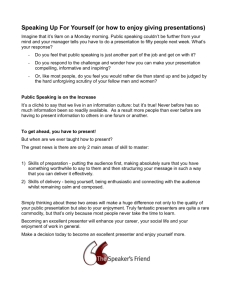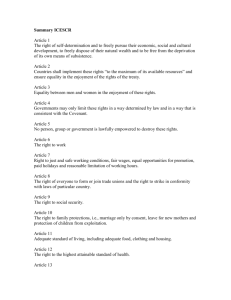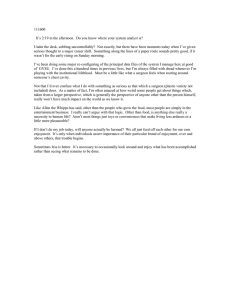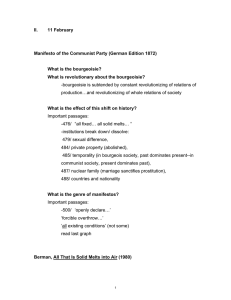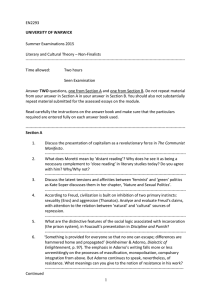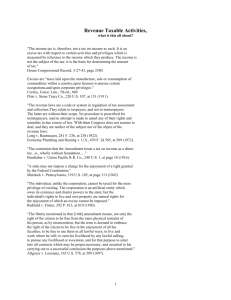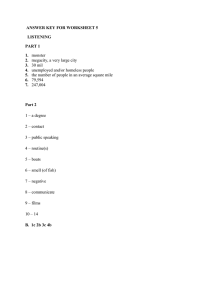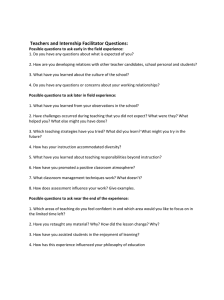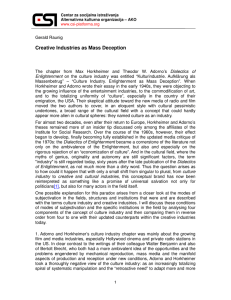EN2294 Summer Examinations 2015 Literary and Cultural Theory – Finalists
advertisement
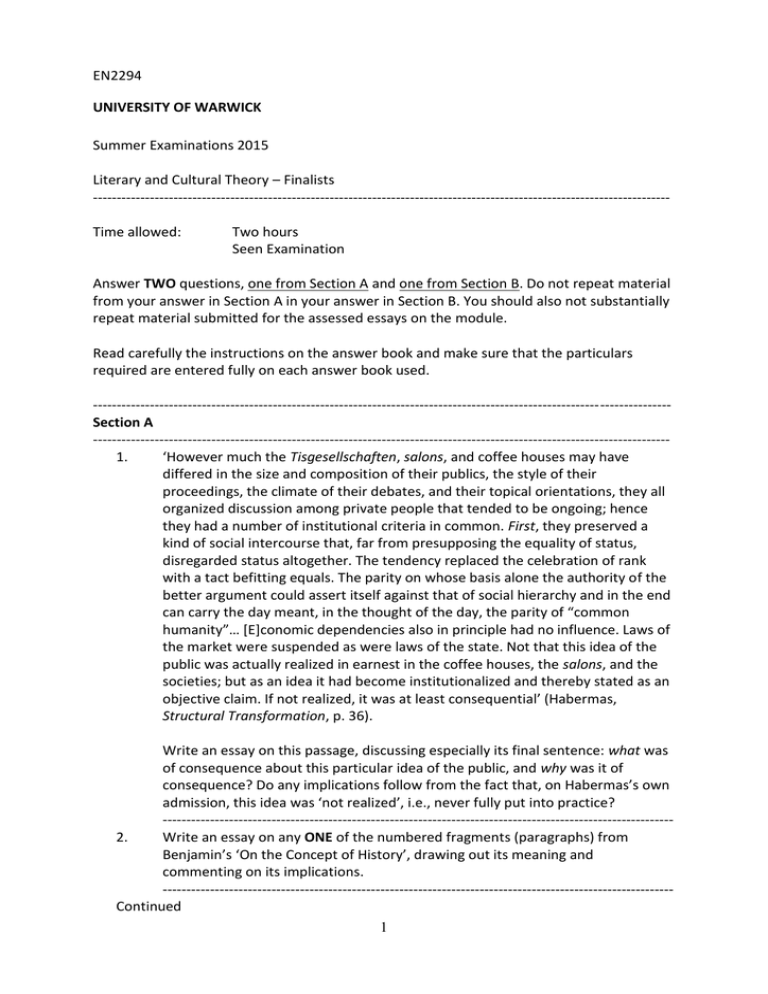
EN2294 UNIVERSITY OF WARWICK Summer Examinations 2015 Literary and Cultural Theory – Finalists -------------------------------------------------------------------------------------------------------------------------Time allowed: Two hours Seen Examination Answer TWO questions, one from Section A and one from Section B. Do not repeat material from your answer in Section A in your answer in Section B. You should also not substantially repeat material submitted for the assessed essays on the module. Read carefully the instructions on the answer book and make sure that the particulars required are entered fully on each answer book used. -------------------------------------------------------------------------------------------------------------------------Section A -------------------------------------------------------------------------------------------------------------------------1. ‘However much the Tisgesellschaften, salons, and coffee houses may have differed in the size and composition of their publics, the style of their proceedings, the climate of their debates, and their topical orientations, they all organized discussion among private people that tended to be ongoing; hence they had a number of institutional criteria in common. First, they preserved a kind of social intercourse that, far from presupposing the equality of status, disregarded status altogether. The tendency replaced the celebration of rank with a tact befitting equals. The parity on whose basis alone the authority of the better argument could assert itself against that of social hierarchy and in the end can carry the day meant, in the thought of the day, the parity of “common humanity”… [E]conomic dependencies also in principle had no influence. Laws of the market were suspended as were laws of the state. Not that this idea of the public was actually realized in earnest in the coffee houses, the salons, and the societies; but as an idea it had become institutionalized and thereby stated as an objective claim. If not realized, it was at least consequential’ (Habermas, Structural Transformation, p. 36). Write an essay on this passage, discussing especially its final sentence: what was of consequence about this particular idea of the public, and why was it of consequence? Do any implications follow from the fact that, on Habermas’s own admission, this idea was ‘not realized’, i.e., never fully put into practice? -----------------------------------------------------------------------------------------------------------2. Write an essay on any ONE of the numbered fragments (paragraphs) from Benjamin’s ‘On the Concept of History’, drawing out its meaning and commenting on its implications. -----------------------------------------------------------------------------------------------------------Continued 1 EN2294 3. ‘The simple idea that dominates the literary world still today, of literature as something pure and harmonious, works to eliminate all traces of the invisible violence that reigns over it and denies the power relations that are specific to this world and the battles that are fought in it. According to the standard view, the world of letters is one of peaceful internationalism, a world of free and equal access in which literary recognition is available to all writers, an enchanted world that exists outside time and space and so escapes the mundane conflicts of human history’ (Casanova, The World Republic of Letters, pp. 42-43). Discuss the terms of Casanova’s critique of ‘the standard view’ in literary scholarship; and evaluate her argument. ------------------------------------------------------------------------------------------------------------ 4. ‘Today … sexual freedom has unquestionably increased. … [At the same time,] sexual liberty is harmonized with profitable conformity’ (Marcuse, Eros and Civilization). Discuss. ------------------------------------------------------------------------------------------------------------ 5. ‘The issue is not one of elaborating a new theory of which woman would be the subject or the object, but of jamming the theoretical machinery itself, of suspending its pretension to the production of a truth and of a meaning that are excessively univocal’ (‘The Power of Discourse and the Subordination of the Feminine’, p. 78). To what extent does Luce Irigaray succeed in putting this plan into practice in her writings? ------------------------------------------------------------------------------------------------------------ 6. ‘[P]aradoxical as it may seem, consumption is defined as exclusive of enjoyment. As social logic, the consumption system establishes itself on the basis of a denial of enjoyment. Enjoyment no longer appears there at all as finality, as rational end, but as the individual rationalization of a process whose ends lie elsewhere. Enjoyment would define consumption for oneself, as something autonomous and final. But consumption is never that. Enjoyment is enjoyment for one’s own benefit, but consuming is something one never does alone (this is the illusion of the consumer, meticulously sustained by the whole of the ideological discourse on consumption). One enters, rather, into a generalized system of exchange and production of coded values where, in spite of themselves, all consumers are involved with all others’ (Baudrillard, ‘Towards a Theory of Consumption’, p. 78). Discuss. ------------------------------------------------------------------------------------------------------------ Continued 2 EN2294 -------------------------------------------------------------------------------------------------------------------------Section B -------------------------------------------------------------------------------------------------------------------------7. Several of the theorists we have read in this module foreground personal experience in different ways as a category or dimension of critical practice. Discuss, with reference to any three theorists you have read this year. ------------------------------------------------------------------------------------------------------------ 8. Horkheimer and Adorno argue that the project of Enlightenment is paradoxically grounded in the domination of nature. To what extent are the theories of such other critics as Nixon, Klein, Parenti, Moore, Davis, and Soper alert to the ‘dialectic of Enlightenment’ as discussed by Horkheimer and Adorno. Answer with reference to Horkheimer/Adorno and any two of these other critics. ------------------------------------------------------------------------------------------------------------ 9. Do you understand the body, and hence identity, to be in the first instance a socio-cultural or a natural category? Answer with reference to Cixous, Soper and Foucault. ------------------------------------------------------------------------------------------------------------ 10. Discuss the status of the ‘subject’ or the ‘individual’, with reference to the work of any three theorists you have read this year. ------------------------------------------------------------------------------------------------------------ 11. In what ways does the development of media technology reshape the politics of culture? Discuss, with reference to at least two of the theorists whose work you have read this year. ----------------------------------------------------------------------------------------------------------- 12. How do you understand the category of ‘world literature’? Answer with reference to any two of the following: Moretti, Casanova, WReC, Apter. -----------------------------------------------------------------------------------------------------------End 3

